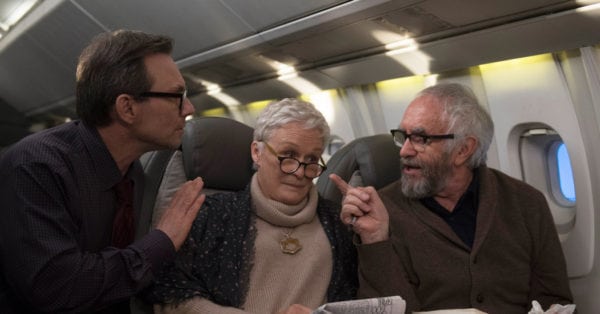The Wife, 2018.
Directed by Björn Runge.
Starring Glenn Close, Jonathan Pryce, Christian Slater, Max Irons, Alix Wilton Regan, Harry Lloyd, Annie Starke, Karin Franz Körlof, Michael Benz, Nick Fletcher, Twinnie Lee Moore, Jane Garioni, and Elizabeth McGovern.
SYNOPSIS:
A wife questions her life choices as she travels to Stockholm with her husband, where he is slated to receive the Nobel Prize for Literature.
The #timesup movement hangs heavy over Björn Runge’s The Wife, his adaptation of Meg Wolitzer’s 2003 novel. It’s an appropriately embittered, scornful study of a forlorn matriarch forced into the acceptance of her husband’s supposed genius through a fog of philandering and hypocrisy.
Glenn Close is Joan Castleman, the titular wife to Jonathan Pryce’s Joe Castleman, a voice of a generation talent enamoured with his own work and now winner of the Nobel Peace Prize for Literature. Joan’s happiness at this success hints at something more melancholy, her smile maybe a façade whist Joe rides a wave of success, bloating his already bulbous ego.
So they fly off to Sweden joined by son David (Max Irons), a budding writer for with a strange resentment for his father. Whilst there, hopeful biographer Nathaniel Bone (Christian Slater) tries to worm his way into their affairs, inadvertently forcing the reveal of hard truths.
Runge intercuts this with flashbacks showing the beginning of Joan and Joe’s relationship, played brilliantly by Annie Starke and Harry Lloyd.
The whole thing plays rather theatrically. It may be beautifully performed, but you can practically see the blocking masking tape, and Runge directs with maybe too much restrained. There is nothing broadly cinematic about the whole affair, he shoots breakdowns and arguments with such a detached eye, it creates a veneer tough to crack.
Jane Anderson’s script too lacks certain subtlety. The audience are spoon fed with little ambiguity as to the films relationships. We understand there’s an undercurrent of resentment between Joan and Joe but the flashbacks exist as exposition dumps whilst Slater’s charming if seedy biographer feels like a late addition as to create a conflict it hasn’t worked for up to that point.
However, it’s all beautifully performed. Pryce – playing the sort of narcissist “genius” he’s become so accustomed to – is superb. His bulbous ego, constructed out of fabrication and distortion is slowly worn at, and Pryce plays this with a wry eye. His eventual breakdown treads the line between truth and desperation beautifully.
But it’s all on Close. Runge shoots her in close ups, giving her little room to breathe and you truly can’t take your eyes off her. She is scornful and proud, conflicted by her husband’s success. There have been six nominations without a win and a seventh seems likely at this point. It’s a grandiose performance from a performer at the absolute peak of her powers.
“I don’t want to be though of as the long suffering wife,” Joan reveals as they head to the Nobel Prize dinner much to the chagrin and confusion of Joe. It’s these moments that work so well. The flashbacks may reveal moments necessary, but they themselves are not.
It’s a film more theatrical than cinematic but performed with immensity undeniable.
Flickering Myth Rating – Film: ★ ★ ★ / Movie: ★ ★ ★
Thomas Harris













